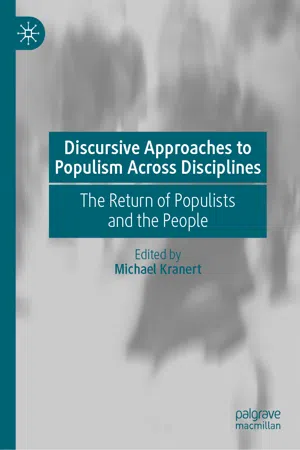Disciplinary affiliations | Methods and theoretical approaches | Political spectrum | Geographical location |
|---|---|---|---|
Political Science (Baysha, Cadalen, Gaul) Linguistics (Demata, Deumert, Issel-Dombert, Kantara, Knoblock, Kranert, Fenton-Smith, Schoor) Education (Brandmayr) Gender Studies (Kahlina) Sociology (Venkov, Mabandla) Journalism (Kelsey) | Anti-Colonialism/Decolonization (Mabandla & Deumert) Argumentation Analysis (Fenton-Smith) Critical Discourse Analysis (Demata, Gaul, Kahlina, Schoor, Brandmayr, Knoblock) Conversation Analysis (Kantara) Corpus Linguistics (Demata, Kranert, Knoblock) Essex School of Discourse Theory (Baysha, Cadalen, Venkov) Frame Semantics (Knoblock) Interpellation (Brandmayr) Multimodality (Issel-Dombert, Brandmayr) Political Myth (Kelsey) | Right-Wing (Baysha, Brandmayr, Gaul, Fenton-Smith, Kahlina, Knoblock, Venkov) Left-Wing (Cadalen, Demata, Issel-Dombert) Transcending Left–Right (Kantara, Kelsey, Kranert, Schoor) Anti-Colonialism/Decolonization (Mabandla & Deumert) | Australia (Fenton-Smith) Austria (Brandmayr) Bolivia (Cadalen) Bulgaria (Venkov) Croatia (Kahlina) Ecuador (Cadalen) Greece (Cantara) Germany (Kranert) Netherlands (Schoor) South Africa/Pan-African context (Mabandla & Deumert) Spain (Issel-Dombert) Sri Lanka (Gaul) Ukraine (Baysha) UK (Demata, Kelsey, Kranert, Schoor) USA (Knoblock, Schoor) |

Discursive Approaches to Populism Across Disciplines
The Return of Populists and the People
- English
- ePUB (mobile friendly)
- Available on iOS & Android
Discursive Approaches to Populism Across Disciplines
The Return of Populists and the People
About This Book
This edited book presents a cross-disciplinary and international conversation about the discursive nature of 'populist' politics. Based on the idea that language and meaning making are central to the political process, the authors present research originating from disciplines such as sociology, political science, linguistics, gender studies and education, giving credence to the variety and context dependence of both populist discourse and its analysis. Using a variety of different theoretical frames, the volume examines international case studies from Europe, Africa, Asia and the Americas, looking at different modes of populism as well as the interaction of populism with other ideologies and belief systems. The chapters draw on several disciplines, and will be of interest to scholars working in linguistics, political studies, journalism, rhetoric and discourse analysis.
Frequently asked questions
Information
Part IPopulism as an Essentially Contested Concept in Academic and Political Discourse
1. Introduction: Discursive Approaches to Populism Across Disciplines
Table of contents
- Cover
- Front Matter
- Part I. Populism as an Essentially Contested Concept in Academic and Political Discourse
- Part II. Populist and Nationalist Discourses: Links and Tensions
- Part III. Populist Discourse and the Politics of (Post-)Truth
- Part IV. Populist Discourse and Discourses of Gender and Sexuality
- Part V. Populist Discourse as Left-Wing and Right-Wing Political Discourse
- Part VI. Populist Discourse Across the Political Spectrum
- Back Matter